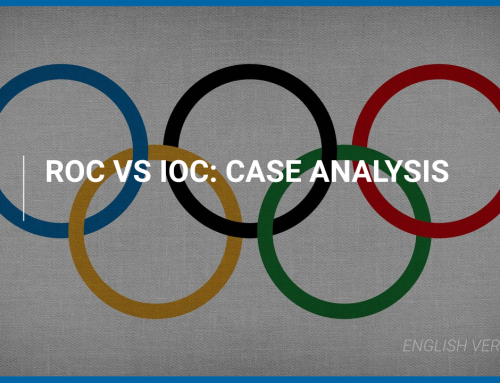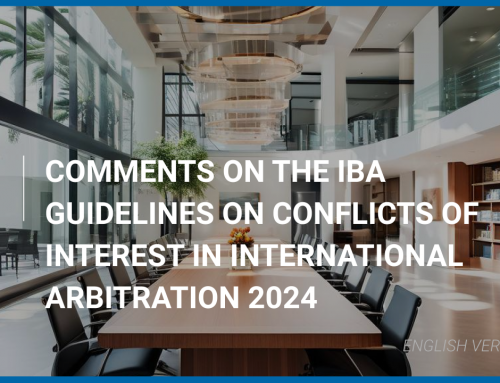Published and translated by Winter – Dávila & Associés .
Paris, 02 may 2022.
1- Introduction
Such an institute would have no reason to exist if we do not conceive society as a system of relationships between individuals, as a result of which a series of conflicts are usually generated, which need to be resolved. This is why the institution of Arbitration arises, in which the parties agree to cede the power to settle a conflict to a person chosen directly or indirectly by them in order to submit to its final decision, through a sentence or Arbitral Award, and therefore is allowing and recognising that the parties, within the face that makes the availability of their rights and by the work and grace of the autonomy of the will, can choose that a neutral third party is the one who determines the fate of their rights.
2- Legal nature of the arbitral award
The purpose of an arbitration process is to resolve a dispute submitted by the parties to the decision of an arbitral tribunal. This decision is embodied in what is called an arbitral award, which is why it is essential to understand the scope of the award.
In an award, it has been said that the parties can entrust their disputes to the decision of arbitrators, i.e. private judges, which is a logical manifestation and consequence of business autonomy. It is explained that, without seeking to replace jurisdiction as a monopoly function of the State, in certain cases, the legislator “authorises” the parties to resolve their disputes by means of a mechanism other than that of the jurisdictional function; at other times it is the law that “imposes” arbitration on private parties in order to allow the elucidation of conflicts of special interests. But in both cases “arbitration has a negotiable and contractual character”. In short, “arbitration can be presented as a transition from a contractual to a judicial solution of the dispute; a subrogate, a substitute for jurisdiction, a para-judicial procedure, in which the State is interested, not only in protecting, but also in exercising a control function of the procedure followed and of the award that is pronounced”. Arbitration “implies a renunciation of jurisdiction by private parties”[1].
YOU CAN ALSO READ: Introduction to ICC Arbitration
3- Definitions of the Arbitral Award
Firstly, an award is defined as a decision or judgement, in the sense of an act by which a dispute is resolved and, therefore, brought to an end[2]. Therefore, it must be understood that the award is the decision that puts an end to the dispute that has been submitted to arbitration. Regardless of whether the award is to be considered final or definitive, it should be borne in mind that it concludes a single and specific arbitration process.
The term award refers to the decision rendered by an arbitrator which serves to resolve the conflict between two or more parties. Thus, the sentence will be the jurisdictional equivalent of the arbitral award.
According to the above definition, the award is a decision issued by the arbitrators, i.e. it is a decision that can only be issued by one or more arbitrators in an arbitration process.
In short, the award is a decision with a legal content that puts an end to a dispute and is different from any other type of decision that may be issued by a judicial body.
That is why the similarities of the award with judgments, other judicial decisions or even other enforceable instruments do not detract from its identity and singularity. In the same way that arbitration is a method of conflict resolution different from the judicial process (despite having been qualified as a jurisdictional equivalent by jurisprudence), the resolution that puts an end to both is equally singular and different with respect to the other.
4- Types of award
Preliminary decisions: preliminary decisions are pronouncements of the arbitrators that resolve an issue that has been introduced into the arbitration and that it is convenient that it be decided before the final award is rendered or without waiting for the arbitration to be completed.
Decisions on the jurisdiction of the arbitral tribunal fall into this category. If one of the parties has challenged the jurisdiction in any way, it is logical that this should be resolved as early as possible. Of course, if the tribunal declares itself incompetent, the proceedings will be terminated, and if it affirms its jurisdiction the proceedings continue. A partial award is one that partially resolves the merits of the case, i.e. it does not rule on all the points in dispute, but on some or some of them whose resolution can be anticipated.
– Partial awards: the possibility for arbitrators to make partial or preliminary awards depends on what the parties have agreed, as they may include certain matters to be resolved separately from the merits of the case, and they may also exclude the tribunal’s power to make partial or preliminary awards.
Moreover, local laws and arbitration rules often propose very different solutions as to the possibility of the tribunal to make partial or preliminary awards.
– Incidental or interlocutory awards: some authors consider that only an award that decides on a part of the subject-matter of the dispute can be considered a partial award, whereas an award that resolves incidental or prejudicial questions, whether procedural or substantive (such as standing, prescription or applicable law), but does not resolve all or part of the subject-matter of the dispute, is not a partial award. This limited conception of the partial award is justified by the fact that only the award on the merits can be the subject of an immediate appeal, all the other decisions of the arbitral tribunal cannot be the subject of an immediate appeal, as they would cause delays to the arbitral procedure that are incompatible with its essence.
YOU CAN ALSO READ: The four Chambers of The Court of Arbitration for Sport
What is intended to be distinguished is the award that defines the merits of the case (in whole or in part) from that which resolves issues that are capable of terminating the arbitration proceedings (jurisdiction, res judicata, statute of limitations, substantive standing, nullity or non-existence of the arbitration agreement).

Photo: pixabay.com
5- Content of the Arbitral Award
Depending on its content, the award may be declaratory, insofar as it recognises and declares the pre-existence of a right or legal situation; constitutive when it creates, modifies or extinguishes a specific legal relationship; and/or condemnatory when it imposes on the respondent (original or counterclaim) the fulfilment of a specific obligation to give, to do or not to do, creating an enforceable title to ensure the effectiveness of the condemnation[3].
6- Requirements of the Arbitral Award
With regard to the requirements, it should be noted that they may vary slightly from country to country, but in general they should contain the following:
– place and date of issue.
– names of the parties and the arbitrators.
– the issue to be submitted to arbitration.
– assessment of the evidence in support of the decision.
– factual and legal grounds for admitting or rejecting the respective claims and defence.
– the decision.
YOU CAN ALSO READ: The uncertain future of sports arbitration clauses in Germany
7- Motivation of the Award
In general, what the perspective suggests that the award must be motivated in the same way as the procedural order requires a judgement to be motivated, loses sight of the fact that the award is, after all, the consequence of an agreement of wills, it is an act of autonomy, even considering the fact that it is issued by a third party. The award is in the sphere of private law, where private autonomy is the rule. And for those who practise in private law, no one is struck by the fact that contracts or their forms of execution lack motivations or explanations, beyond demonstrating the existence of an agreement.
As has been pointed out, “the aim should be to explain the reasons as concisely as possible, to the extent necessary according to the nature of the dispute. What the parties want is to know the reasoning behind the decision, not to receive a legal lecture”[4].
8- Notification of the Award
The award must be duly notified to the parties, as this is the way in which they can be informed of the decision. The arbitrators shall do so in the manner and within the period of time agreed by the parties, or, failing agreement on this point, by delivering a signed copy to each of the parties within the period of time indicated above. In any event, the award may be notarised and either party, at its own expense, may request the arbitrators, prior to notification, to have the award notarised.
The general rule is that the place of arbitration is the place agreed by the parties and in the absence of an agreement, the place determined by the court on the basis of the circumstances. It is important to note that the place of arbitration is not necessarily relevant for determining the law applicable to the merits of the dispute, which will be the law of the contract and will not necessarily coincide with the law of the place of arbitration.
9- Annulment of the Award
In the systems in which arbitration works, the appeal for annulment has two characteristics: it is limited to an exhaustive and restrictive list, linked to formal aspects of the arbitration (jurisdiction, validity of the agreement, notifications, compliance with agreed rules, etc.), i.e. it does not involve substantive aspects of the decision[5] and can only be brought after the award has been made, i.e. ex post of the arbitrators’ decision[6].
Common grounds for annulment of arbitral awards:
– Failure to have been notified of appointment of an arbitrator.
– That the composition of the arbitral tribunal has not been in accordance with the parties’ agreement.
– That the award has been rendered without the required majorities.
– That the award has been rendered outside the time limit.
– That the award has been rendered on a subject matter that has not been submitted.
10- Enforcement of the Award
If no appeal for annulment has been lodged against an arbitral award or if the appeal is rejected by the judiciary, the award has the same value as a judgement and is effective and enforceable[7].
Normally, the application for enforcement must be accompanied by a copy of the arbitration agreement and the arbitral award. In addition, if there was a second instance of arbitration, a copy of the respective award must be attached.
11- International Arbitral Award
It applies without prejudice to any multilateral or bilateral treaty in force in the republic, it is international if:
1.- The parties, at the time of the conclusion of the agreement their domiciles in different states.
2.- Some of the parties have more than one domicile, the one that has the closest relationship with the arbitration agreement will be taken into account and if they do not have a domicile, their habitual residence will be taken into account.
The New York Convention, as its title indicates, applies to “foreign arbitral awards”. Article I of the Convention establishes two criteria to determine to which awards it applies. The first criterion is eminently territorial. An award is foreign when it has been made “in the territory of a State other than that in which recognition and enforcement is sought”. It is therefore sufficient, in the light of this first criterion, that the award was made in a country other than the one in which recognition and enforcement is sought[8].
The New York Convention has a universal character, which means that it is applicable for the recognition of any foreign award, irrespective of whether the country from which the award originates is a party to the Convention or not.
YOU CAN ALSO READ: CAS Compliance: Proposals for improvements
12- Conclusion
The arbitral award is the decision or judgment rendered by the arbitrators resolving the matter submitted for their consideration. It may be final, interlocutory or by agreement of the parties. It is subject to the presumption of res judicata, enforceability and presumption of legality. Lastly, the assumptions under which the non-recognition and non-enforcement of the award are determined are uniform thanks to the New York Convention. These international instruments create an international legal system that regulates the recognition and enforcement of awards in member countries. The law that applies to the recognition and enforcement of a foreign arbitral award is the law of the place where recognition and enforcement is sought there. It must be distinguished from the law that is applied to decide the nullity of the award, since it is the law of the place where the award was made, decided by the competent courts of that place.
[1] CNCiv.Com.Fed., Sala III, 26-5-1994, L.L. 1995-A-124; DJ 1995-1-490.
[2] YÁÑEZ VELASCO, Ricardo. Óp. cit., p. 678
[3] YÁÑEZ VELASCO, Ricardo. Op. pag.460
[4] Redfern, Alan, Hunter, Martin y Partasides, Constantine.”Teoría y práctica del arbitraje” cuarta edición. La Ley. Buenos Aires, 2007.pag.534
[5] Alfredo Bullard Gonzales, “Litigio Arbitral”,editorial Palestra, primera edición 2016, pag.448, Al respecto del artículo 62º inciso 5 de la ley peruana de arbitraje.
[6] Alfredo Bullard Gonzales, “Litigio Arbitral”,editorial Palestra, primera edición 2016, pag.449, Al respecto del artículo 64º de la ley peruana de arbitraje.
[7] Canturarias Salaverry, Fernando, “Ejecución de los laudos arbitrales en el Perú”, derecho y sociedad Nº25, lima 2005.
[8] Carlos Alberto Soto Coagula, “El Arbitraje en el Perú y en el Mundo”, IPA editoriones magna de 2008 pág. 586 y 587
Bibliography:
Bullard Gonzales Alfredo, “Litigio Arbitral”,editorial Palestra, primera edición 2016, pag.448, Al respecto del artículo 62º inciso 5 de la ley peruana de arbitraje.
Bullard Gonzales Alfredo, “Litigio Arbitral”,editorial Palestra, primera edición 2016, pag.449, Al respecto del artículo 64º de la ley peruana de arbitraje.
Canturarias Salaverry, Fernando, “Ejecución de los laudos arbitrales en el Perú”, derecho y sociedad Nº25, lima 2005.
Carbonell O´Brien Esteban, “Derecho Arbitral con énfasis en la ley de arbitraje peruana”, editores jurista, 2016, pag.424
Cantuarias Salaverry, Fernando. Arbitraje Comercial y de las Inversiones. Lima: UPC, 2007, p. 295.
CNCiv.Com.Fed., Sala III, 26-5-1994, L.L. 1995-A-124; DJ 1995-1-490.
Corte de Apelaciones de decimoprimero distrito, Yearbook Comm, Arb. XXIV (1999), pag.823
Hunter, Alan, Martin y Partasides, Constantine.”Teoría y práctica del arbitraje” cuarta edición. La Ley. Buenos Aires, 2007.pag.534
Ley peruana de Arbitraje, artículo 20° – Forma y contenido del laudo
Ottolenghi, Mauricio: “Conceptos fundamentales para una construcción del instituto arbitral. Naturaleza del Arbitraje”, en Revista de Derecho Procesal, director Hugo Alsina, año 1, 1954, primera parte, Yáñez Velasco, Ricardo. Óp. pag.460
Roca Martínez, Jose Maria, “Arbitraje e instituciones arbitrales”. Bosch. Barcelona, 1992, pag.103, citado por Cantuarias Salaverry, Fernando “Arbitraje comercial y de las inversiones”, Universidad peruana de ciencias aplicadas, Lima, Perú 2008, pag.315
Soto Coagula Carlos, “El Arbitraje en el Perú y en el Mundo”, IPA editoriones magna de 2008 pág. 586 y 587
Soto Coagula Carlos, “El Arbitraje en el Perú y en el Mundo”, IPA editoriones magna de 2008 pág. 612
Varady,Tibor,Jhon J.Barcelò III, Arthur T.von Mehren “International Commercial Arbitration A transnational perspective”. Thomson Reuters, cuarta edición EE.UU, 2009. Pag.627
Yáñez Velasco, Ricardo. Óp. cit., p. 678
If you need lawyers for an arbitration
Do not hesitate to contact us!
(e-mail: contact@wdassocies.com)










[…] the Arbitration and Conciliation Act of 1988, an arbitral award could be set aside where an arbitrator had “misconducted himself”. Misconduct could be […]